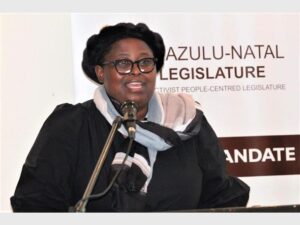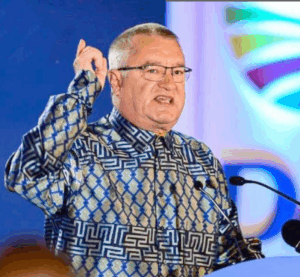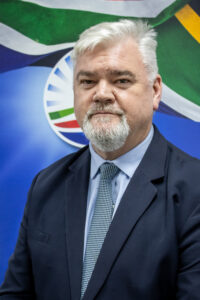The Constitution of the World Health Organisation (WHO) states that “Health is a state of complete physical, mental and social well-being and not merely the absence of disease or infirmity.”
Government must therefore deliver an efficient, reliable, caring and fair health service, committed to ensuring universal access to healthcare. This must not only address the needs of patients outlined in Section 27 of the Constitution but must be ever-cognisant of every user’s dignity: as in Sections 1 and 7 and in particular Section 10 of the Bill of Rights which states; “Everyone has inherent dignity and the right to have their dignity respected and protected.”
Everyone should be aware that the delivery of universal access to healthcare is inextricably related to ensuring that all the principles of Batho Pele are upheld when delivering this service.
While the various issues and realities of the budget were tabled in my report earlier, it is noteworthy that between the 6th term and now, the position of KZN Health Department Chief Financial Officer (CFO) – which was vacant for what seemed like a century – was filled. The effect of this is palpable through the findings of the Auditor General (AG). As previously mentioned, this is the second of 9 provincial departments to receive an unqualified audit opinion, the other of course being the Western Cape.
Healthcare is one of the most significant line items in KZN’s budget, receiving an allocation of almost 36% across all departments and entities. Despite this substantial expenditure, the quality of healthcare services in our province has deteriorated over time.
Regrettably, national government’s proposed solution to deliver quality public healthcare to millions of South Africans is based on a misguided belief that the only way to ensure quality healthcare is by centralising all healthcare system functions through its National Health Insurance (NHI).
It would be remiss not to mention that the DA maintains that NHI is not the solution to Universal Access to Healthcare for all. In its current form, NHI is unaffordable and needs urgent review. The realities of the budgets for healthcare nationally and provincially show that the fiscus is not rich enough.
KZN’s Department of Health (DoH), under MEC Nomagugu Simelane, also cannot ignore the following;
• Medico-legal claims
• Emergency Medical Services (EMS)
• Medicine stock-outs and shortages and;
• Waiting times, which must be halved in the short to medium-term
Then there is the accountability required to ensure that this massive 24/7/365 department contributes every ounce of it’s being to become part of the backbone of a capable and ethical state. The DA has every intention of walking this path with the MEC and her department.
While the healthcare system cannot be reduced to a few items, it is imperative to recognise these as pressure points. Keeping the department afloat and ensuring better health and wellness requires laser like focus.
With regards to medico-legal claims, a total of 1 678 cases with summons – with a contingent liability of R20billion and with best value of R5,932billion – was recorded as at 31 December 2023. The total contingent liability for medico-legal cases continues to increase, with the result that the number of new medico-legal cases exceed the cases settled.
While there is a commitment to ensuring all records are on a single electronic system, to help prevent loss, alterations and unscrupulous behaviour by staff and others, only a portion of KZN facilities have managed to move the needle slightly. The DA-run Western Cape Health Department has, however, managed to achieve this feat across its facilities by sourcing external funding. This funding will also assist with making the current paper-based Supply Chain Management (SCM) processes electronic. KZN’s Government of Provincial Unity (GPU) cannot be allergic to sourcing donations to achieve this.
The DA has also submitted a written parliamentary question to the MEC about the absence of toners for printers in one facility but we know that there are more that are affected. A simple matter such as this has a massive impact on medico-legal claims, where notes between facilities and in-patient records are illegible and court cases are lost because of this. Archiving may result in a decrease in contingent liability but awaits the response from the Department of Justice. Medico-legal claims have become a challenge for the public health sector and a huge risk to healthcare service delivery, particularly in light of the department’s shrinking budgets.
The DA notes with extreme concern that the KZN’s people still have to wait for hours in outlying districts to receive emergency medical care. They often die while waiting, give birth on their own while waiting, and their conditions deteriorate significantly while waiting, leading to more interventions and all-in-all creating more complications for KZN’s already injured healthcare system.
Also concerning is that while EMS has noted an increase in demand for services, there are no service expansion plans in place to deal with this. Statistically the average EMS response for both urban and rural areas decreased from 51.7% in 2020/21 to 45.1% in 2022/23. The increase in downtime of ambulances due to the aging fleet, with increased costs has placed additional pressure on waiting times and the budget. Additionally, training and retaining skilled staff, the demand for inter-facility transfers, and upgrading wash-bays and bases remain trip points.
Given these pressures and the lack of properly directed resources, it is unlikely the DoH will achieve the ideal of having at least one vehicle for every 10 000 people in KZN, or adequate bays and ideal response times to P1 emergencies without a focused intervention into the service.
The DA looks forward to battling these critical issues out in committee so that we can begin to see a better resourced, better equipped and ultimately super responsive EMS service. A quick move that requires some willingness, is to engage with and work with private providers, who by the way are licenced under the MEC’s department licences.
On medicines, while Tracer medicine stock-out rate remained below 5% for both KZN’s Provincial Pharmaceutical Supply Depot (PPSD) and facilities during 2022/23 – they were stock-outs none the less. These are the patients that contact the DA and whose lives are often drastically affected by the unavailability of medicines they need.
Challenges facing the availability, storage and distribution of medicines include the lack of inadequate physical infrastructure and vital equipment, leading to non-compliance of the PPSD with legislation. The current PPSD Warehouse Management System (WMS) is outdated and not suitable for supporting current departmental business processes.
The DA has the following proposals for MEC Simelane and her department;
• Operate within the fiscal envelope: In an ideal world there would be there would be infinite sums of money to pursue the department’s endeavours, however, there are limited resources, financial and human. The DoH must now operate with a budget impacted by fiscal consolidation cuts but, so have other departments. The DoH needs to establish what it can and can’t do, given the financial constraints and availability. And then, what it chooses to do, must be done well. Focusing on the five points I raised earlier, what the DoH chooses to allocate funds towards is what it should be judged on with rigorous, fearless and consequence-related oversight. In instances, this will be unannounced as per the directive of the Premier. Funds are limited, it’s a given that not all needs will be met all at once, but the needs that are met, must be met well. The DA will play its part in the GPU to ensure this
• Ensure adequate provision for maintenance: Building new facilities may well be necessary and this shows the desire to expand service delivery offerings. However, the DoH should always make adequate provision for maintenance of its current capital stock first and foremost. Otherwise, the rats at Northdale Hospital, or the mosquito problem at Victoria Mxenge Hospital (formerly King Edward VIII) – or worse – will be seen in many more facilities
• Work with Provincial Treasury to make it more difficult for disgruntled service providers to lodge frivolous appeals and stall the awarding of new services providers for services such as waste disposal, security etc. This should aid in limiting irregular expenditure on expired contracts, which usually occurs due to new contracts being appealed. This issue accounts for the bulk of irregular expenditure each year
• Re-establish a functional and independent Provincial Health Ombudsman to holistically manage complaints, ensure accountability and aid in the reduction of medico-legal claims
As part of KZN’s GPU, the DA is committed to playing a key role as we work to turn around our province’s injured and ailing health services. Our people deserve nothing less.








